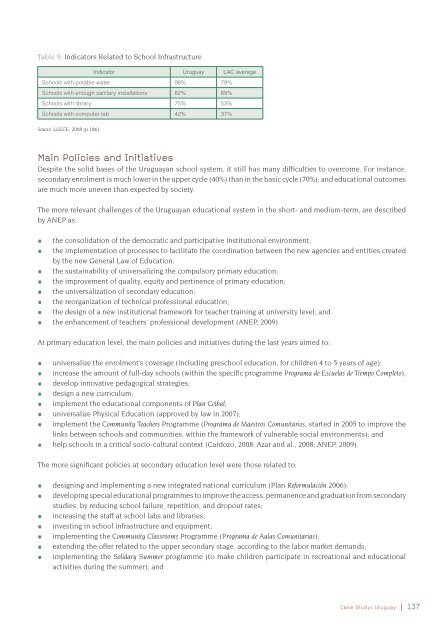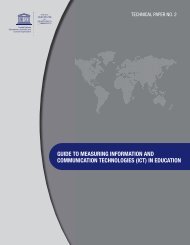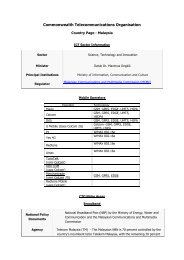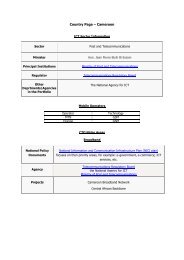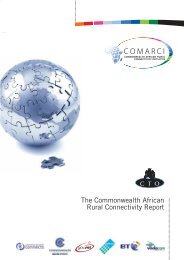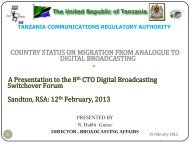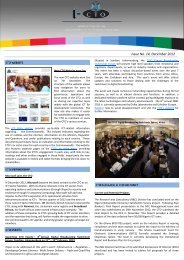Transforming education: the power of ICT policies - Commonwealth ...
Transforming education: the power of ICT policies - Commonwealth ...
Transforming education: the power of ICT policies - Commonwealth ...
You also want an ePaper? Increase the reach of your titles
YUMPU automatically turns print PDFs into web optimized ePapers that Google loves.
Table 9: Indicators Related to School Infrastructure<br />
Indicator Uruguay LAC average<br />
Schools with potable water 98% 79%<br />
Schools with enough sanitary installations 82% 69%<br />
Schools with library 75% 53%<br />
Schools with computer lab 42% 37%<br />
Source: LLECE, 2008 (p.186)<br />
Main Policies and Initiatives<br />
Despite <strong>the</strong> solid bases <strong>of</strong> <strong>the</strong> Uruguayan school system, it still has many diffi culties to overcome. For instance,<br />
secondary enrolment is much lower in <strong>the</strong> upper cycle (40%) than in <strong>the</strong> basic cycle (70%); and <strong>education</strong>al outcomes<br />
are much more uneven than expected by society.<br />
The more relevant challenges <strong>of</strong> <strong>the</strong> Uruguayan <strong>education</strong>al system in <strong>the</strong> short- and medium-term, are described<br />
by ANEP as:<br />
apple <strong>the</strong> consolidation <strong>of</strong> <strong>the</strong> democratic and participative institutional environment;<br />
apple <strong>the</strong> implementation <strong>of</strong> processes to facilitate <strong>the</strong> coordination between <strong>the</strong> new agencies and entities created<br />
by <strong>the</strong> new General Law <strong>of</strong> Education;<br />
apple <strong>the</strong> sustainability <strong>of</strong> universalizing <strong>the</strong> compulsory primary <strong>education</strong>;<br />
apple <strong>the</strong> improvement <strong>of</strong> quality, equity and pertinence <strong>of</strong> primary <strong>education</strong>;<br />
apple <strong>the</strong> universalization <strong>of</strong> secondary <strong>education</strong>;<br />
apple <strong>the</strong> reorganization <strong>of</strong> technical pr<strong>of</strong>essional <strong>education</strong>;<br />
apple <strong>the</strong> design <strong>of</strong> a new institutional framework for teacher training at university level; and<br />
apple <strong>the</strong> enhancement <strong>of</strong> teachers’ pr<strong>of</strong>essional development (ANEP, 2009).<br />
At primary <strong>education</strong> level, <strong>the</strong> main <strong>policies</strong> and initiatives during <strong>the</strong> last years aimed to:<br />
apple universalize <strong>the</strong> enrolment’s coverage (including preschool <strong>education</strong>, for children 4 to 5 years <strong>of</strong> age);<br />
apple increase <strong>the</strong> amount <strong>of</strong> full-day schools (within <strong>the</strong> specifi c programme Programa de Escuelas de Tiempo Completo);<br />
apple develop innovative pedagogical strategies;<br />
apple design a new curriculum;<br />
apple implement <strong>the</strong> <strong>education</strong>al components <strong>of</strong> Plan Ceibal;<br />
apple universalize Physical Education (approved by law in 2007);<br />
apple implement <strong>the</strong> Community Teachers Programme (Programa de Maestros Comunitarios, started in 2005 to improve <strong>the</strong><br />
links between schools and communities, within <strong>the</strong> framework <strong>of</strong> vulnerable social environments); and<br />
apple help schools in a critical socio-cultural context (Cardozo, 2008; Azar and al., 2008; ANEP, 2009).<br />
The more signifi cant <strong>policies</strong> at secondary <strong>education</strong> level were those related to:<br />
apple designing and implementing a new integrated national curriculum (Plan Reformulación 2006);<br />
apple developing special <strong>education</strong>al programmes to improve <strong>the</strong> access, permanence and graduation from secondary<br />
studies, by reducing school failure, repetition, and dropout rates;<br />
apple increasing <strong>the</strong> staff at school labs and libraries;<br />
apple investing in school infrastructure and equipment;<br />
apple implementing <strong>the</strong> Community Classrooms Programme (Programa de Aulas Comunitarias);<br />
apple extending <strong>the</strong> <strong>of</strong>fer related to <strong>the</strong> upper secondary stage, according to <strong>the</strong> labor market demands;<br />
apple implementing <strong>the</strong> Solidary Summer programme (to make children participate in recreational and <strong>education</strong>al<br />
activities during <strong>the</strong> summer); and<br />
Case Study: Uruguay | 137


